 'Jin' named the word of the year by cross-strait netizens
'Jin' named the word of the year by cross-strait netizens Chinese scientific expedition goes to build new Antarctica station
Chinese scientific expedition goes to build new Antarctica station
 Chinese naval escort fleet conducts replenishment in Indian Ocean
Chinese naval escort fleet conducts replenishment in Indian Ocean 17th joint patrol of Mekong River to start
17th joint patrol of Mekong River to start China's moon rover, lander photograph each other
China's moon rover, lander photograph each other Teaming up against polluters
Teaming up against polluters
SEOUL, Dec. 30 -- Japanese Prime Minister Shinzo Abe's outrageous visit to the controversial Yasukuni shrine has stirred widespread condemnation in South Korea which suffered from Japan's colonial rule in the early 20th century.
South Korean President Park Geun-hye on Monday appeared to criticize Japan for "digging up wounds of the past," the Yonhap News Agency reported.
"In the new year ... I hope that there will be no act of letting trust between countries crash and people's feelings deteriorate by digging up wounds of the past," Park said. Yonhap noted her remarks was apparently directed at Japan, though she did not mention it by name.
Her comments came after Abe paid respect to the notorious war shrine on Dec. 26 for the first time in around seven years as the incumbent Japanese prime minister.
The shrine has been seen as a symbol of Japan's war of aggression and colonial rule as it enshrines war criminals, including Hideki Tojo who plunged East Asia into a devastating war and Kuniaki Koiso who as governor-general during the colonial rule that pillaged the country through coerced conscription, forced labor and extortion.
"President Park has made it clear on several occasions that she would not hold a summit with Abe unless Japan faces up to history and shows its sincerity of building trust with neighboring country. But Abe's Dec. 26 visit made it clear that his previous claims of repairing trust was untruthful," Chun Kalim, professor of South Korea's Hoseo University told Xinhua.
South Korean foreign minister Yun Byung-se on Monday also warned that Seoul will deal sternly with Japan's nationalist moves, saying further repercussions on the already strained relations between South Korea and Japan are inevitable.
Seoul will seek cooperation with the international community to cope with the unjust historical perspective of Japanese leaders, Yun said at a meeting of the National Assembly committee on foreign affairs.
South Korea last Friday lashed out at the visit in an unusually strong tone through a government statement rather than the foreign ministry spokesman to express its outrage against the anachronistic act.
"The government cannot help but feel outraged by and deplore the December 26 visit of Japanese Prime Minister Shinzo Abe to Yasukuni shrine, which glorifies Japan's past colonial rule and war of aggression and enshrines its war criminals, in defiance of the concerns and warnings of neighboring countries and the international community," the statement said.
It said that Abe's visit clearly demonstrates his erroneous understanding of history, adding that Abe will not be able to make contribution to promote peace in the region with such a wrong concept of history, urging Tokyo's full contrition and apology for its past wrongdoings.
Meanwhile, South Korea's Defense Ministry dismissed the possibility to further military ties with Japan.
Asked whether there is any scheduled exchange of military personnel between Seoul and Tokyo next year, Defense Ministry deputy spokesman Wi Yong-seop told a routine press briefing that he had no choice but to ask back whether it would be possible for any military exchange to take place given Japan's untrustworthy behavior as seen in Abe's visit to the Yasukuni shrine.
The country's ruling and opposition lawmakers have also agreed to adopt a resolution denouncing the visit.
Choi Kyung-hwan, floor leader of the ruling Saenuri Party, criticized Abe's anachronistic right-leaning stance and ambition of reviving militarism has "far more to lose than gain."
His counterpart of the opposition Democratic Party, Jun Byung- hun, also condemned the visit has destroyed peaceful order of Northeast Asia.
Around 100 South Korean citizens rallied in front of the Japanese Embassy in downtown Seoul on Friday to protest against Abe's visit to the notorious war shrine.
"Abe's provocative move demonstrated the rise of Japan's right-wingers. The icy relations between South Korea and Japan are unlikely to thaw in 2014 if Abe continues his irrational and erroneous activities," said Chun Kalim.
South Korea's Arilang TV reported that ties between Seoul and Toyko are "at one of the worst level of the post-war era" following Abe's highly controversial visit.
It added that considering several unfavorable events in store, including the island dispute, the screening results of Japan's history textbooks, Japan's continuous push for collective self- defense and others, further tensions will be ignited between the two nations next year.
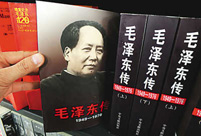 Commemorate 120th birth anniversary of Mao Zedong
Commemorate 120th birth anniversary of Mao Zedong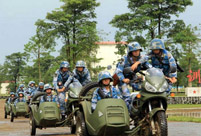 Female soldiers of PLA Marine Corps in training
Female soldiers of PLA Marine Corps in training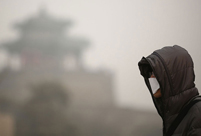 Chinese cities to have a very grey Christmas as smog persists
Chinese cities to have a very grey Christmas as smog persists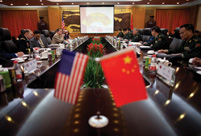 China and U.S. - the national image in each other’s eyes
China and U.S. - the national image in each other’s eyes The Liaoning's combat capability tested in sea trial
The Liaoning's combat capability tested in sea trial Chinese pole dancing team show their moves in snow
Chinese pole dancing team show their moves in snow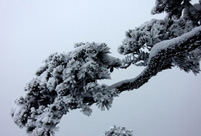 Rime scenery in Mount Huangshan
Rime scenery in Mount Huangshan Ronnie O'Sullivan: My children mean the world to me
Ronnie O'Sullivan: My children mean the world to me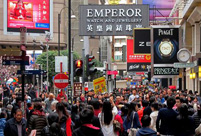 Shopping in Hong Kong: a different picture
Shopping in Hong Kong: a different picture Red crabs begin annual migrations in Australia
Red crabs begin annual migrations in Australia Fleet hits targets in training
Fleet hits targets in training Mother practices Taiji with her son
Mother practices Taiji with her son  Crashed French helicopter salvaged
Crashed French helicopter salvaged Winter travels in Anhui
Winter travels in Anhui  Bird show opens to public in Calcutta, India
Bird show opens to public in Calcutta, IndiaDay|Week|Month